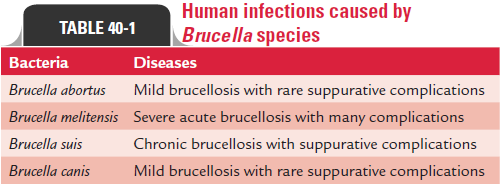Chapter: Microbiology and Immunology: Bacteriology: Brucella
Brucella
Brucella
Introduction
Brucellosis is primarily a zoonotic infection caused by Brucella organisms infecting the domestic animals. The disease continues to be a major public health problem worldwide. The condition is known by various names, such as Malta fever, Mediterranean fever, undulant fever, etc.
Brucella
Classification
The genus Brucella consists of small, nonmotile, nonsporing, nontoxigenic, nonfermenting aerobic, and Gram-negative coccobacilli. The bacteria can grow on a variety of culture media including serum dextrose, blood, and chocolate agar. They are strict parasites of domestic and wild animals, but they can infect humans, which are accidental hosts. The genus Brucella consists of seven species, four of which are human pathogens. These are Brucella abortus, Brucella melitensis, Brucella suis, and Brucellacanis (Table 40-1). Human infections with Brucella neotomae and Brucella ovis have not been described. Moreover, each Brucella species has a characteristic predilection to infect certain animal species where it causes chronic disease that persists for life.

Related Topics